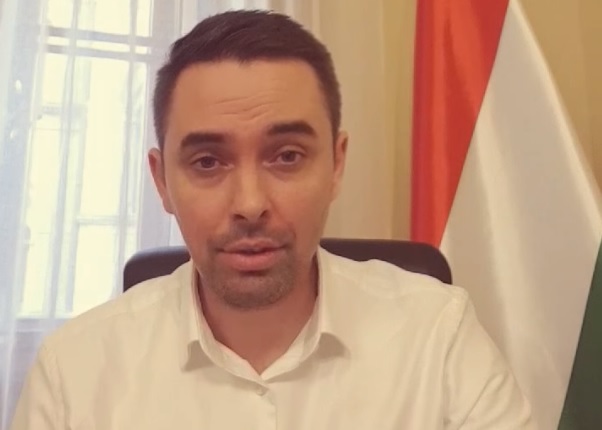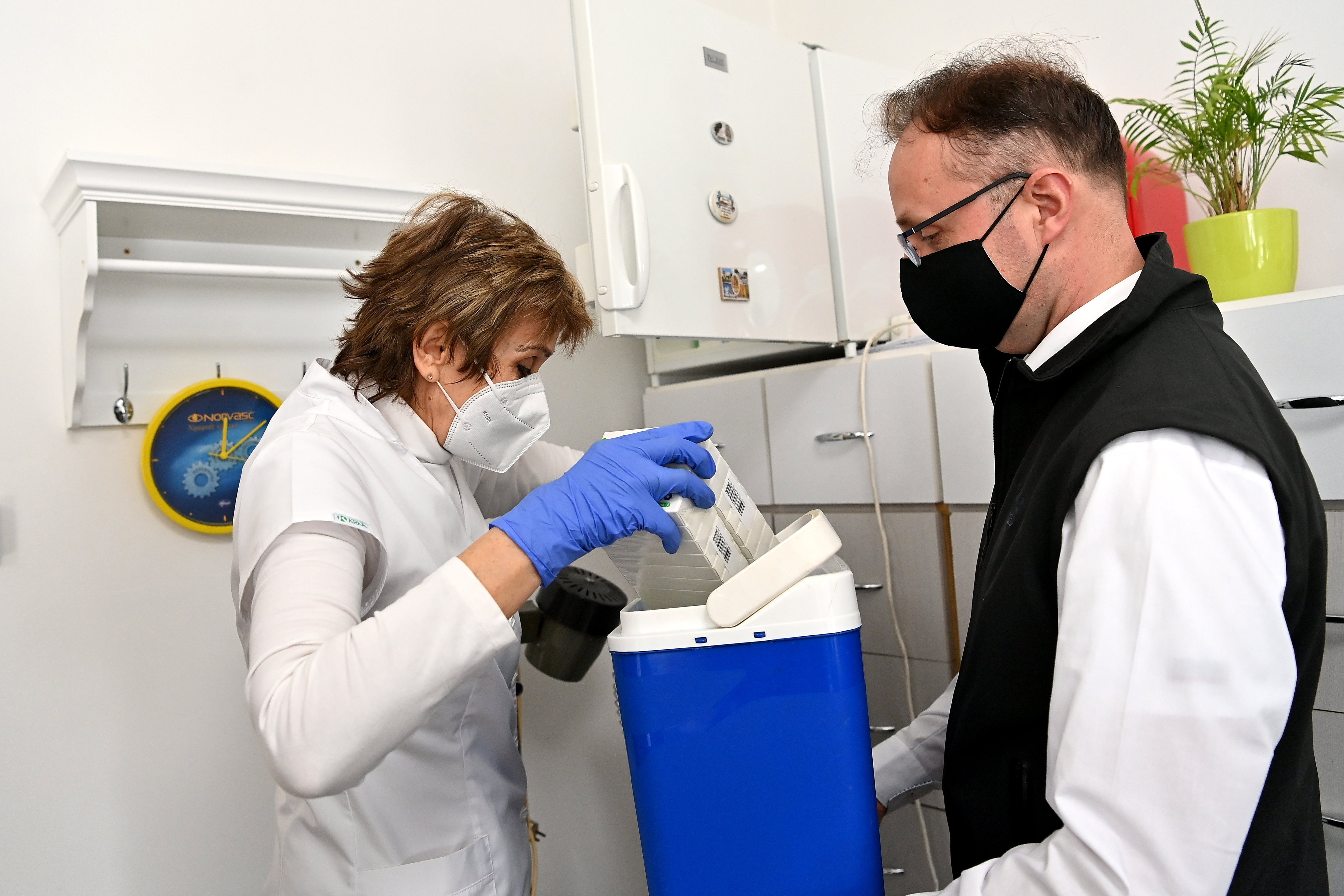National Security Committee chairman reveals plans for secret underground tunnel
- Stay updated on the latest news from Hungary by signing up for the free InsightHungary newsletter:
The chairman of parliament's National Security Committee, János Stummer (Jobbik), posted a video on Facebook Tuesday in which he purported to reveal classified information on government plans to build a secret tunnel worth HUF 2 billion (€5.5 million) underneath the Puskás Ferenc athletic stadium in Budapest.
"Yesterday morning, I was given a paper stating that Viktor Orbán wanted to build his own tunnel in Puskás Stadium worth HUF 2 billion. This plan came into my hands because they wanted to classify this investment for many years through the National Security Committee, avoiding the scandal that this news could cause,” Stummer said.
The politician said he tried to prevent the plan by not allowing it to be placed on the Committee's agenda, but that committee vice-chair János Halász (Fidesz) informed him that the rules of the session would be changed to allow for the plan to be heard. The Fidesz majority on the Committee then "voted to approve this secret tunnel for their boss," Stummer said, adding that he expected to be removed from the Committee and taken to court over revealing the information.

Puskás Arena responded to the news on Facebook, writing that a 50-meter long tunnel would be built to allow for "protected persons" - such as foreign or domestic politicians, performers or other special guests - to be safely transported into the stadium without disrupting pedestrian and motor traffic during events. The Arena argued that the details of the tunnel's construction, such as the locations of emergency escape routes and surveillance stations, needed to be classified to prevent them from falling into the hands of malign actors.
Speaking at a press conference Thursday, the prime minister's chief of staff, Gergely Gulyás, said the tunnel was necessary to ensure the safe arrival of international heads of state and sports figures to the stadium. There is no need to remove Stummer from the National Security Committee, he said, since there is nothing secret about the plans for the tunnel.
Germany's Deutsche Welle to launch Hungarian-language programming
German public service broadcaster Deutsche Welle (DW) will begin producing Hungarian-language programs in an effort to provide "real stories" to Hungarian audiences, the network's director Peter Limbourg said on the German RBB media podcast last week.
The state-owned international network will reportedly focus on topics it says are infrequently covered in Hungarian media, including human and minority rights and LGBTQ issues.
"This is a European country where media plurality is in danger, and the independent, critical press is under pressure," Limbourg said. "So we thought Deutsche Welle has a place here, as in Poland."
DW earlier produced a Hungarian-language radio program from the 1960s to the 1990s, and currently produces news programs in dozens of languages, according to Szabad Pécs, which broke the story.
Limbourg said DW would first begin producing videos in Hungarian, and would launch a YouTube channel by late March. The network could possibly work together with local media outlets, he added.
DW does not seek to be the voice of the opposition, he said, but he expects that the expansion of media plurality in Hungary will not please everyone.
Indeed, news of the decision was not well received by the Hungarian government's international spokesman, Zoltán Kovács, who called it an act of "German cultural imperialism," and claimed that "the market determines media and press relations in Hungary."
"What kind of content will Deutsche Welle produce in Hungarian? Programs on European 20th century history, perhaps? No. A look back at the era of colonialism in Africa? No. Profiles of Marx, Engels and other modern German disruptors?" Kovács wrote on his blog. He later posted a meme on Facebook suggesting DW's decision was an attempt to interfere in 2022 parliamentary elections.
Vaccinations begin with China's Sinopharm vaccine
Doctors on Wednesday began administering the first shots of a Chinese Covid-19 vaccine developed by state-owned company Sinopharm, the start of a vaccination campaign government officials say could inoculate 368,000 people within the week. General practitioners around the country received an average of 55 doses each, and were instructed to administer them to elderly patients.
Hungary is the first country in the European Union to use a Chinese vaccine, and the bloc's medicines regulator, the European Medicines Agency, has not approved Sinopharm for use. Hungary expects to receive 5 million doses of the jab across the next four months, enough to vaccinate 2.5 million people. But polling shows that Hungarians trust the Chinese vaccine the least among the five now available in Hungary (Sinopharm, Pfizer-BioNTech, Moderna, AstraZeneca and Russia's Sputnik V.)
Uncertainty about Sinopharm, which has not yet released detailed results of phase 3 clinical trials, could result in disruptions to the vaccination program: one doctor in Budapest called 168 patients before finding 55 willing to receive the Sinopharm vaccine, among whom several later changed their minds.
The use of vaccines not approved by the EMA could result in some Hungarians facing limited travel opportunities in Europe as countries enact policy on immunity certificates. Poland's health minister announced on Wednesday that beginning on Saturday, only travellers with a negative coronavirus test or proof of having received two doses of an EMA-approved vaccine would be permitted to cross into the country from Slovakia and Czechia. All others must enter 10 days of mandatory quarantine, including those who have been inoculated with a non-EMA approved vaccine like Sinopharm or Sputnik V.
Hungary's decision to use Sinopharm on elderly populations comes as China is using the vaccine only on patients up to 59 years of age. Less than 1 percent of those participating in the vaccine's clinical trials were over the age of 60, and potential risks and side effects on the elderly are unknown. Similarly, clinical trials of the AstraZeneca vaccine contained few elderly subjects. Hungary as a result decided to administer that vaccine only to those 59 and younger, while allowing the Sinopharm jab to be used on elderly patients.
Pandemic restrictions extended as Covid-19 cases rise sharply
Current pandemic restrictions, in place since November 11, will be extended until at least March 15 as a "third wave" of the Covid-19 pandemic hits Hungary, Gergely Gulyás said at a virtual press conference Thursday.
"We hope that we are in the last phase of these restrictions...But now the opinions of pandemic experts are very clear: the third wave has reached Hungary. All forecasts indicate that the numbers will get dramatically worse in the next one or two weeks," Gulyás said, adding that restrictions could be lifted within a month depending on the results of the national consultation launched last week.
In a Facebook video on Wednesday, Prime Minister Viktor Orbán said that while more vaccines were arriving in the country, "the third wave is threatening Hungary," and the easing of restrictions cannot currently be discussed.
The steady decline in cases and deaths that began in Hungary in December has reversed course in recent weeks, and a particularly sharp rise in new cases was recorded this week: on Wednesday, there were 70 percent more new cases in the previous seven days than in the prior seven-day period, by far the most rapid rise in Europe. Deaths are also on the rise, with 120 recorded in the last 24 hours, the highest since January 12.
While Hungarians were asked to provide their opinions on reopening the country through the national consultation, the government is unlikely to lift pandemic restrictions even if responses indicate a popular desire to do so. The deadline for returning the online consultation was extended from March 1 until mid-March, and it is unclear what purpose the survey will serve now that the pandemic's third wave has convinced government officials that lifting restrictions is off the table.
The government's strategy appears to be keeping restrictions in place while increasing the rate of vaccinations, made possible by the quick approval last week of the Chinese Sinopharm vaccine. State Secretary Dr. István György said during a press briefing of the Emergency Task Force on Tuesday that 368,000 vaccinations could be given this week, bringing the total to over 800,000. György urged Hungarians to trust in the Sinopharm vaccine and Russia's Sputnik V.
"Every vaccine available in Hungary is safe and can provide protection against virus infection. This is also true of the Eastern vaccines despite all rumors to the contrary," he said.




